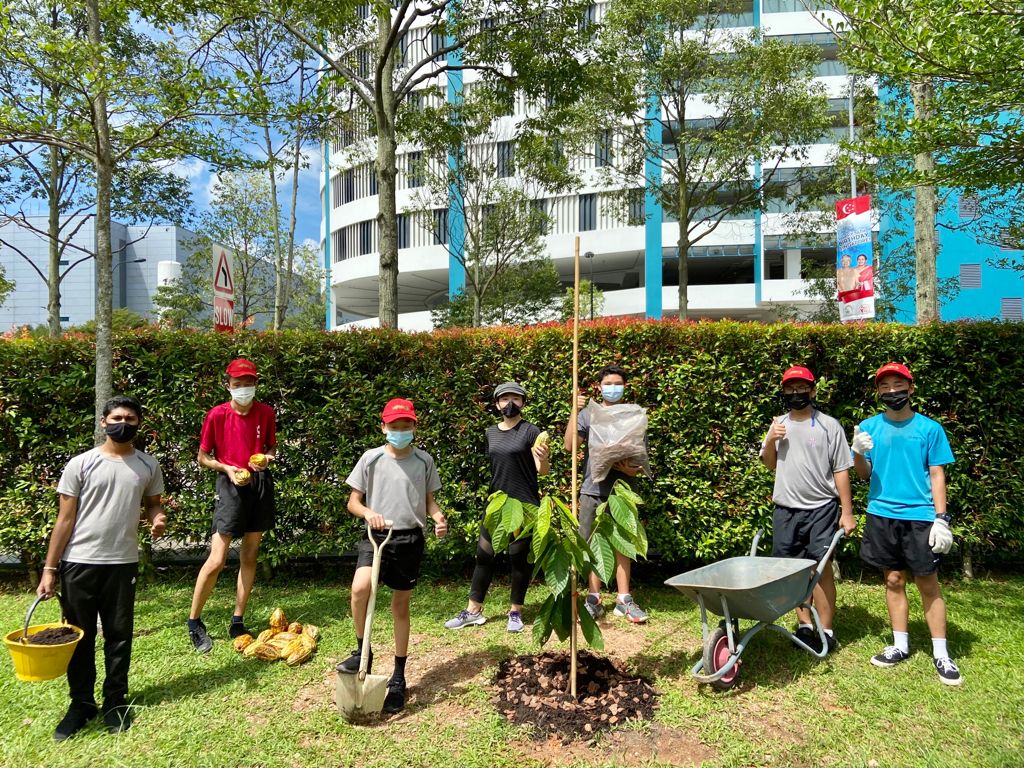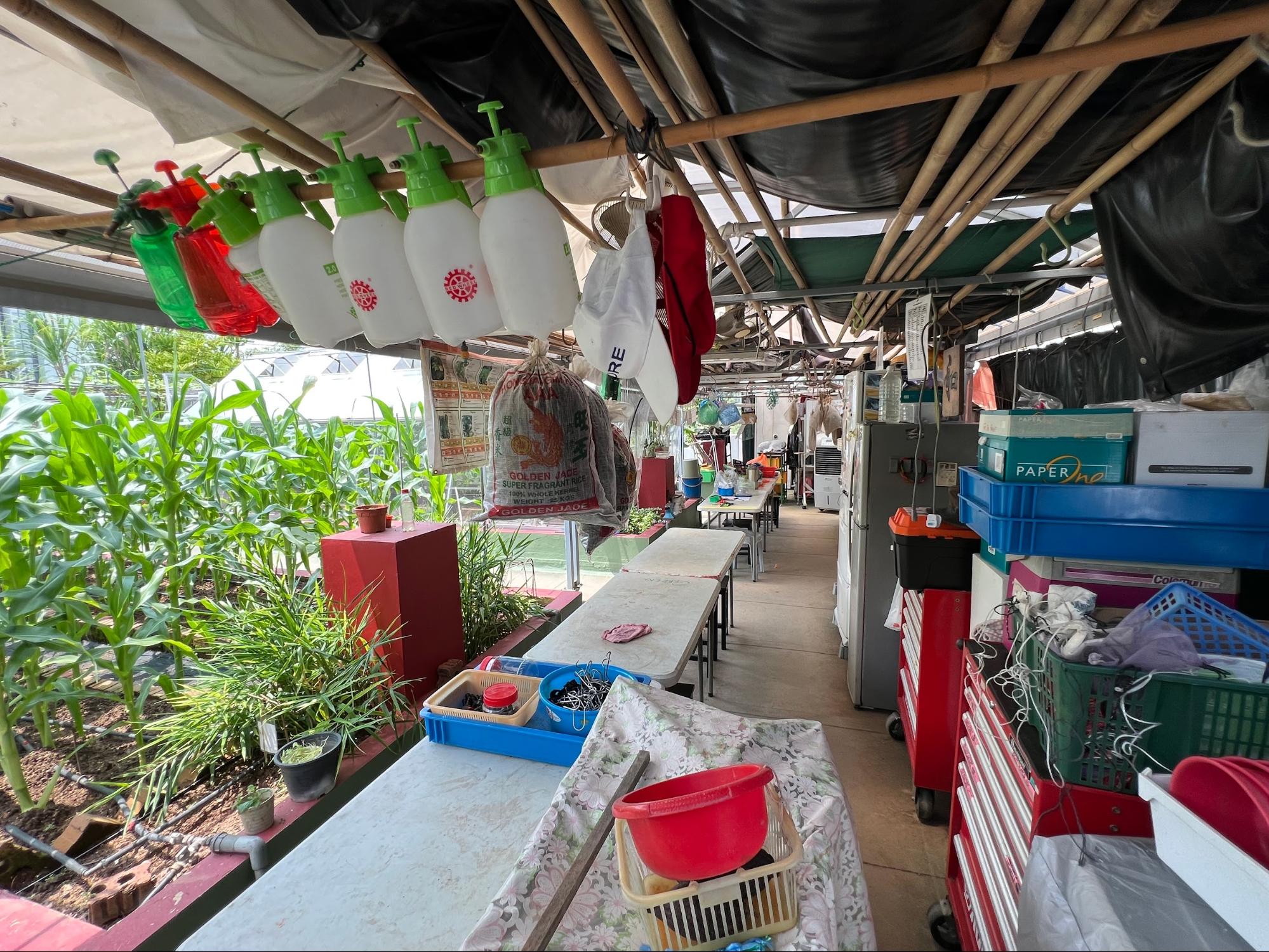Follow us on Telegram for the latest updates: https://t.me/mothershipsg
At Spectra Secondary School (Spectra), farming is not a thing of the past but an opportunity for the future.
There, farming is one of the co-curricular activities (CCA) on offer.
Urban Farmers, Spectra's farming CCA, was started in 2021, and it currently has around 30 members made up of Secondary 1, 2 and 3 students.
 Photo courtesy of Spectra.
Photo courtesy of Spectra.
 Photo courtesy of Spectra.
Photo courtesy of Spectra.
 Photo courtesy of Spectra.
Photo courtesy of Spectra.
The CCA is run by teachers who tend to Spectra's rooftop garden and indoor hydroponics farm.
 Photo courtesy of Spectra.
Photo courtesy of Spectra.
 Photo by Gawain Pek.
Photo by Gawain Pek.
 Photo courtesy of Spectra.
Photo courtesy of Spectra.
 Photo courtesy of Spectra.
Photo courtesy of Spectra.
 Photo courtesy of Spectra.
Photo courtesy of Spectra.
 Teacher Lyvenne Chong with the latest crop of rice. Photo by Gawain Pek.
Teacher Lyvenne Chong with the latest crop of rice. Photo by Gawain Pek.
Opportune developments
When Mothership spoke with the teachers in late 2019, Urban Farmers had not been born. Back then, the school ran a modular Garden-based Service Learning (GBSL) programme for all Secondary 1 students.
We asked the teachers how things have evolved since then, so much so that they now have a CCA dedicated to farming.
Two key events had spurred the creation of Urban Farmers -- the Covid-19 pandemic and the government's 30-by-30 goal.
The Covid-19 pandemic gave the students a "first-hand look" at how Singapore's food supply was affected when borders are closed, science coordinator Hamsavallii Suppayan Sodimani (or Hamsa for short) pointed out.
Putting two and two together, Hamsa shared that the teachers began to explore and include themes like food security in the GBSL programme, which was then expanded into a CCA.
"We want the Urban Farmers to learn that growing food in land scarce Singapore can also be done indoors without soil," another teacher Lyvenne Chong shared.
In February 2021, the Ministry of Sustainability and the Environment launched the Singapore Green Plan 2030.
To ensure a more resilient food supply, the plan included the 30-by-30 target of building up our agri-food industry’s capability and capacity to produce 30 per cent of our nutritional needs locally and sustainably by 2030.
The push to localise a portion of Singapore's food supply has led to an explosion of urban farms in Singapore.
Harvesting potential
In the same year the government's plan was launched, a former conference room in the school was converted into an indoor hydroponics farm at Spectra.
The hydroponics farm is completed with irrigation systems and the characteristic LED grow lights, with budding plants sprouting from neatly arranged trays.
 Photo by Kow Zi Shan.
Photo by Kow Zi Shan.
 Photo by Kow Zi Shan.
Photo by Kow Zi Shan.
 Photo by Kow Zi Shan.
Photo by Kow Zi Shan.
While industry-grade hydroponics farms often look like something straight out of a sci-fi film, Spectra's farm is housed on wooden shelves which adds a rustic feel to the setup.
This is a new venture for Spectra's Urban Farmers, Chong confessed, and there are still lots to figure out.
"You talk about soil science, you talk about the control of nutrients", she explained.
Chong mentioned that out in the industry, the "big boys" are already using sensors and Internet of Things technology to automatically trigger processes in their urban farms.
The setup at Spectra, on the other hand, is rudimentary.
However, the goal at Spectra's hydroponics farm is not sophistication, but exposure, Chong highlighted.
"We are getting them the exposure to the basics first, when they go to ITE and polytechnic then they will do the more advanced technology", Chong said.
"If you don't give them the exposure to experience they will never know that this is an opportunity for them", she added.
The space is also used by students studying IoT applications to make it a “smart” farm.
 Photo by Gawain Pek.
Photo by Gawain Pek.
 Transplanting vegetable seedlings into the hydroponics system. Photo courtesy of Spectra.
Transplanting vegetable seedlings into the hydroponics system. Photo courtesy of Spectra.
The next step for the Urban Farmers is to build partnerships with organisations like NParks, so that activities like learning journeys or work attachments can be arranged for the students.
"Then, the kids can see where their growth and career opportunities are," Chong elaborated.
So far, Spectra has partnered with local chocolatier Janice Wong to grow cocoa trees on its campus, with the hope that one day the trees will bear fruits and produce cocoa for use in Wong's confectioneries.
 Photo courtesy of Spectra.
Photo courtesy of Spectra.
 Photo courtesy of Spectra.
Photo courtesy of Spectra.
 Cacao fruits growing in the school. Photo courtesy of Spectra.
Cacao fruits growing in the school. Photo courtesy of Spectra.
 Full-grown cacao pods courtesy of Janice Wong. Photo courtesy of Spectra.
Full-grown cacao pods courtesy of Janice Wong. Photo courtesy of Spectra.
Inclusive learning for all
Evidently, the hydroponics farm was a sharp contrast to the rooftop garden.
Compared to the blazing sun, heat and well-worn equipment at the rooftop garden, the hydroponics farm was calm and cool with sounds of trickling water making up the ambience.
Entering the indoor farm was almost like walking into a spa room.
 The hydroponics farm. Photo by Kow Zi Shan.
The hydroponics farm. Photo by Kow Zi Shan.
 Photo courtesy of Spectra.
Photo courtesy of Spectra.
 The edible garden on the rooftop. Photo by Gawain Pek.
The edible garden on the rooftop. Photo by Gawain Pek.
 Photo by Kow Zi Shan.
Photo by Kow Zi Shan.
The controlled environment inside the hydroponics farm has also afforded the Urban Farmers greater inclusivity, particularly for students with Autism Spectrum Disorder (ASD).
It is a “safe, predictable environment” where these students can come every week, regardless of rain or shine.
What the garden represents
While the work at the garden might be tough for the Urban Farmers, it is precisely the difficulty and challenge that comes with the garden work that makes it all the more worthwhile, Hamsa explained.
When we asked Zachary and his friends, Jamin, 14 and Chloesia, 15, if they were proud to be part of the Urban Farmers, they answered "yes" in resounding unison.
 Photo by Gawain Pek.
Photo by Gawain Pek.
For Hamsa, the profundity of what the garden means to her could not be distilled into one word. The garden, to her, "represents what we do here in our school".
"Yes, they're complaining. Yes, they're all whining. But at the end of the day, when they taste success, I think that's very important for our students, because I think a lot of them don't have a lot of that in their lives to hold onto. So I think the garden represents that."
 Photo courtesy of Spectra.
Photo courtesy of Spectra.
"What they're doing in the garden is pretty much like the work that teachers put in to nurture the kids", Audrey Tok, English teacher and our guide for the day, chimed in.
It has been about nine years since the teachers and students first began work on the farming initiative.
The school community had melon growing competition as well as rice planting and harvest events.
"As the kids grow, the garden grows together with them," Chong summed up.
Psssst! Follow us on LinkedIn for more stories like these.
Top image via Lyvenne Phoon/Facebook, Gawain Pek
If you like what you read, follow us on Facebook, Instagram, Twitter and Telegram to get the latest updates.
